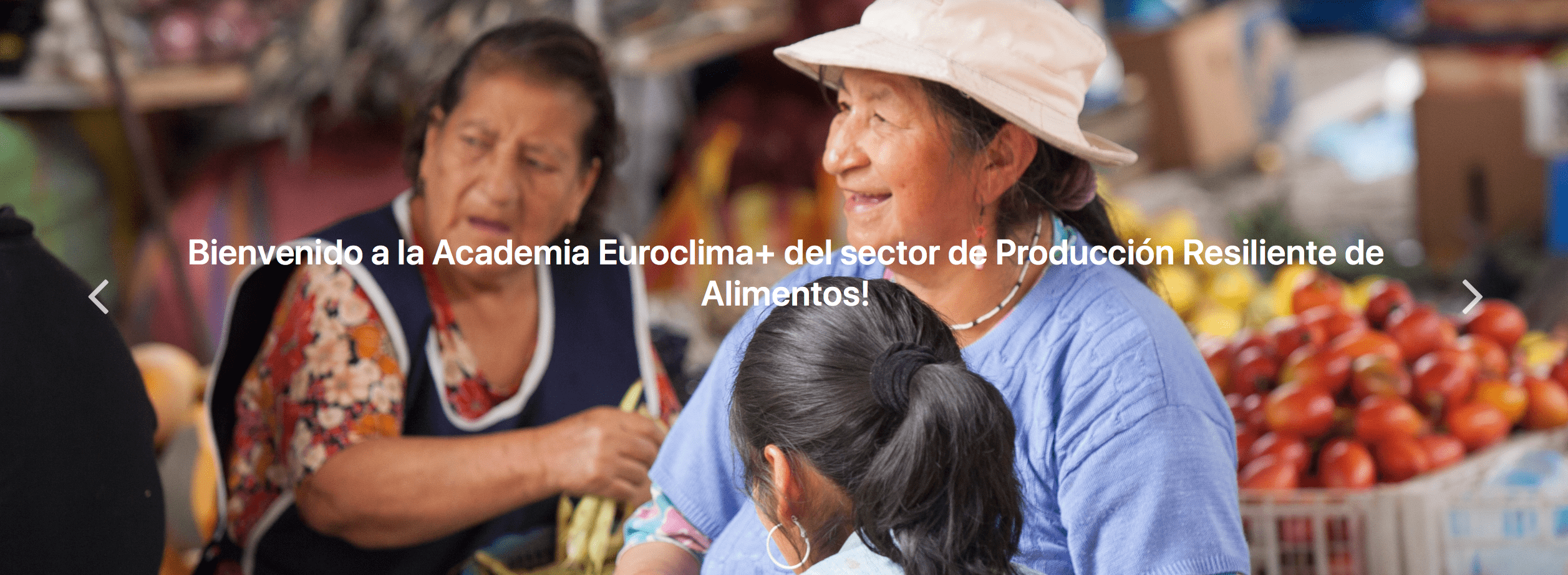June 19 to July 31, 2020 – The Euroclima+ Programme held the pilot course Reference Framework for the implementation of the Nationally Determined Contributions in the agro-food sector.
Initially planned as classroom training, the course was moved to a virtual venue due to the restrictions imposed by the Covid-19 pandemic and its direct result is that professionals from the Resilient Food Production (RFP) sector are now knowledge multipliers on the importance of the sector in the implementation of national commitments. The course has been built to be adapted and replicated in other programme sectors and for other stakeholders.
On June 19, 2020, the pilot course Reference Framework for the Implementation of Nationally Determined Contributions (NDC) began, with 20 participants from 10 Latin American countries, specialists in training, technical advising, coordination, and communication, of whom 35% were women.
In conclusion, participants are now familiar with the basics of the framework for implementing NDCs in the agricultural sector and recognise the importance of the sector in implementing their country's commitments. The results of the course held and the satisfaction of participants and facilitators have validated the concept of the course, as not only was the training objective fully achieved per se, but the course remains ready to be replicated by the trained multipliers and other stakeholders almost immediately.
Key factors in this success have been the availability of training materials developed by the German Society for International Cooperation (GIZ) GmbH and the flexibility, as well as the motivation and dedication of the team of facilitators to adapt the methodology as well as the training materials for virtual implementation. The course was coordinated by Dr. Andrea Schloenvoigt with support from the RFP sector Technical Assistance team.Contents and method: EUROCLIMA+ Academy
The basic virtual course consists of 40 teaching hours. The RFP sector's Technical Assistance launched the virtual platform Academia Euroclima+ RFP to offer the pilot course, a virtual campus, in which "learning-doing" is done, working with real cases.
Course contents are distributed in six thematic modules (one per week) that address the reference framework of the Paris Agreement and the NDCs, adaptation and mitigation strategies, climate financing and the enhanced transparency framework. As a result of the course, participants have also developed a first action plan on how to multiply the concepts and lessons learned in their work context.
|
"This course has laid the foundations and shown the synergies that occur between the 6 modules of the virtual course, I definitely leave with great knowledge and tools that will be useful for multiplying knowledge within my area of work". Testimony of a pilot course participant.
|
The course combines individual work with group work, with direct guidance from facilitators to participants, and group counselling. Materials include videos, readings, and practical cases. Students can make inquiries in forums and via messaging and they have learned to use virtual tools that facilitate interactive work. Weekly video conferences are held in which the results are presented and analysed and the lessons learned from each module are systematised. The Euroclima+ RFP Academy offers a library with audiovisual material and complementary readings.
The richness of a multidisciplinary group of participants
The pilot experience has shown that the course is adapted to the previous experiences of the participants, from beginners in all technical content to specialists in one or several pillars of the Paris Agreement or in communication and visibility issues, who can level their knowledge with the materials and methods. This diversity favours the formation of interdisciplinary working groups and collegial advice. The participants in the pilot course came from 10 countries: Argentina, Bolivia, Colombia, Ecuador, Guatemala, Honduras, Nicaragua, Panama, Peru and Uruguay, of which 50% were from non-governmental organisations, 30% from national institutions, 15% from international cooperation or research organisations, and 5% from bilateral cooperation.
Results: approved
At the beginning of the course, participants indicated their interest in learning how to multiply the knowledge acquired to integrate NDC implementation into technical assistance for communities, strengthening climate governance and related policies, and integrating Paris Agreement pillars into institutional and project communication plans. At the end, they declare that they have concrete ideas on how to multiply what they have learned, and feel ready to replicate or adapt course content to their work context.
|
“Very valuable and rewarding course. It gave me access to very orderly information on the scope of the Paris Agreement, the NDCs, and the contributions of projects to their implementation. It also contributed to the construction of communication plans and products.” Testimony of a pilot course participant.
|

Facilitators and participants in the last closing webinar of the NDC virtual courses for the Resilient Food Production sector
Beneficiaries
|
“In Argentina, the Ministry of Environment is starting a new phase of work with the provinces (sub-national governments). In this regard, the course is key to the transmission of many of the concepts and knowledge acquired in pursuit of the joint formulation of policies and lines of work for the proper and effective implementation of the national NDC.” Testimony of a pilot course participant.
|
|
"What we learned in the course in our case (Bolivia) will have two levels: The first one, with political authorities, for which we will coordinate with the APMT (Focal Point) on the possibility of generating a training action plan at this level. The second will be carried out with the co-executors and authorities of the local governments with whom an action plan will be jointly drafted ". Testimony of a participant in the pilot course. |
The direct number of beneficiaries of this first wave of knowledge multipliers is estimated at 150 professionals, including technical assistance technicians, public sector officials, private sector and civil society professionals. The plan is to replicate the course with other sectors of the Euroclima+ programme and a diploma course with academic credits is being analysed through a cooperation agreement with universities and academic centres, which would mean that at least another 150 professionals would be trained in the next 12 months.
The Reference Framework course for the implementation of NDCs is flexible and easily replicable in other sectors of the Euroclima+ programme as well as by external partners. In this first pilot edition, participants have already submitted five proposals that provide guidance on how to adapt the course, ranging from an academic diploma to a series of informative webinars.
For more information:
Reference Framework course for the implementation of NDCs, an initiative of the EUROCLIMA+ Resilient Food Production sector
Email: This email address is being protected from spambots. You need JavaScript enabled to view it.



